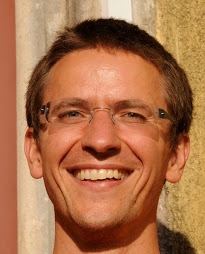Teil des Programms der “Mensch und Computer 2015″ sind drei eingeladene Vorträge (Keynotes).
Yvonne Rogers: „User-less or User-full Interfaces?“
Montag, 7.9.2015, 9:00 – 10:30
 For more than 30 years, UX and Usability have become the bread and butter of HCI. Our community has produced an impressive array of methods, principles and tools to ensure that new interfaces are easy to learn, use and remember. However, recently there has been a growing unease about our role, value and function. With the ascendancy of AI, data science and IoT – an over-arching goal is to strive for optimization, safety and efficiency through removing the user out of the loop. The user-interface as we know it will cease to be. Example technologies, such as driverless cars, smart buildings, and domestic robots, will literally take the control out of the hands of users. Do we want to be moving ever more towards a future of ‘user-less’ interfaces? What will become of the relationship between mensch and computer that we know and love so well? In my talk I argue for a future of ‘user-full’ interfaces where new technologies continue to be designed to augment rather than replace people. In particular, I argue for rethinking HCI as a form of Hybrid-Computer Interaction where HCI meets AI squarely in the eye.
For more than 30 years, UX and Usability have become the bread and butter of HCI. Our community has produced an impressive array of methods, principles and tools to ensure that new interfaces are easy to learn, use and remember. However, recently there has been a growing unease about our role, value and function. With the ascendancy of AI, data science and IoT – an over-arching goal is to strive for optimization, safety and efficiency through removing the user out of the loop. The user-interface as we know it will cease to be. Example technologies, such as driverless cars, smart buildings, and domestic robots, will literally take the control out of the hands of users. Do we want to be moving ever more towards a future of ‘user-less’ interfaces? What will become of the relationship between mensch and computer that we know and love so well? In my talk I argue for a future of ‘user-full’ interfaces where new technologies continue to be designed to augment rather than replace people. In particular, I argue for rethinking HCI as a form of Hybrid-Computer Interaction where HCI meets AI squarely in the eye.
Yvonne Rogers is the director of the Interaction Centre at UCL (UCLIC), deputy head of department for Computer Science and a professor of Interaction Design. She is the Principal Investigator for the Intel-funded Cities collaborative research Institute (cities.io) at UCL. She is also an honorary professor at University Cape Town and has spent sabbaticals at Stanford, Apple, Queensland University, Melbourne University, University Cape Town and UCSD. Her research is in the areas of ubiquitous computing, interaction design and human-computer interaction. She has been instrumental in promulgating new theories (e.g., external cognition), alternative methodologies (e.g., in the wild studies) and far-reaching research agendas (e.g., “Being Human: HCI in 2020” manifesto), and has pioneered an approach to innovation and ubiquitous learning. She is a co-author of the definitive textbook on Interaction Design and HCI just out in its 4th edition that has sold over 150,000 copies worldwide and has been translated into 6 languages. She is a fellow of the BCS and the ACM CHI Academy. She was also awarded a prestigious EPSRC dream fellowship concerned with rethinking the relationship between ageing, computing and creativity.
Janaki Kumar: „Creativity at Work! – Humanizing the Enterprise through Design“
Dienstag, 8.9.2015, 9:00 – 10:30
 Janaki Kumar is the Head of Strategic Design Services, America in SAP’s Design and Co-Innovation Center.
Janaki Kumar is the Head of Strategic Design Services, America in SAP’s Design and Co-Innovation Center.
She leads a team of designers who work directly with customers to transform their user experience. She has over a decade of experience building, coaching, and leading high performance teams to deliver design-led innovation.
She is the co-author of the book ‚Gamification at Work – Designing Engaging Business Software‘. She has given a TEDx talk on Gamification at Work. Janaki has a Masters in Information Systems from Boston University. She has authored 20 intellectual property patent applications of innovative user experiences.
Twitter: @JanakiKumar
TEDx Talk: https://www.youtube.com/watch?v=6wk4dkY-rV0
Book: http://www.amazon.com/Gamification-Work-Designing-Engaging-Business/dp/8792964079
To deliver best in class user experiences to business users, design practitioners need to consider not just the user interface of applications, but the end-to-end customer experience.
The enterprise software industry is undergoing a transformation as users expect simple, easy-to-use experiences from their business software. However, to deliver on this expectation, enterprise software vendors face three primary hurdles:
- The complexity of their customer’s information technology landscapes,
- Complexity of business processes in their customer’s organizations, and
- Lack of design skills in customer’s IT organizations.
In this talk, Janaki Kumar will describe these changing expectations and unique challenges in enterprise software user experience design. She is outline the user experience strategy that SAP has developed to enable this shift from features to experience.
Janaki will introduce Design Thinking, a structured process for creativity and innovation, along with three case studies from the Design and Co-Innovation Center (DCC), an in-house design agency within SAP.
Florian Michahelles: „Interaktion mit dem Internet der Dinge“
Mittwoch, 9.9.2015, 11:00 – 12:30
 Florian Michahelles leitet die „Web-of-Things“ Forschungsgruppe bei Siemens Corporate Technology in Berkeley, Kalifornien. In seinem Vortrag reflektiert er darüber, wie die aktuellen Entwicklungen im Internet der Dinge und eine grundlegende Veränderungen in der Industrie (Stichwort: Industrie 4.0) unsere Interaktion mit Technik in der Arbeits- und Lebenswelt nachhaltig verändern.
Florian Michahelles leitet die „Web-of-Things“ Forschungsgruppe bei Siemens Corporate Technology in Berkeley, Kalifornien. In seinem Vortrag reflektiert er darüber, wie die aktuellen Entwicklungen im Internet der Dinge und eine grundlegende Veränderungen in der Industrie (Stichwort: Industrie 4.0) unsere Interaktion mit Technik in der Arbeits- und Lebenswelt nachhaltig verändern.
